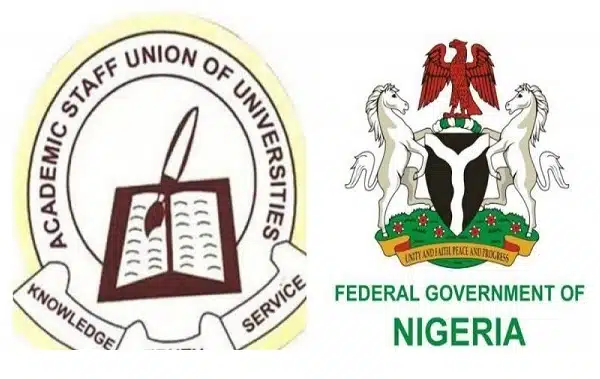The Nigeria Labour Congress (NLC) has reaffirmed its unwavering support for the Academic Staff Union of Universities (ASUU), declaring that the union’s long-standing struggles with the Federal Government represent not merely a labour dispute, but a national fight for the survival and integrity of Nigeria’s educational system.
NLC President, Comrade Joe Ajaero, made this known during a virtual public dialogue titled “A Conversation with the ASUU President”, moderated by Nigerian-born historian and global scholar, Professor Toyin Falola. The event, which drew an audience of over 1.2 million participants from 27 countries, underscored the global concern about the deteriorating state of Nigeria’s higher education system.
NLC’s Position: A Fight Beyond Wages
Comrade Ajaero stressed that ASUU’s agitation extends far beyond the issues of salary arrears or improved remuneration, but rather focuses on safeguarding the dignity of the teaching profession and rescuing Nigeria’s education from total collapse.
“University lecturers are not just workers — they are the builders of character and the shapers of national destiny,” he declared. “When you destroy the foundation of education, you destroy the nation’s future. That is why the NLC will continue to stand shoulder to shoulder with ASUU in this struggle.”
Ajaero accused successive governments of paying lip service to education while allowing university infrastructure to deteriorate and lecturers’ morale to sink. He recalled that agreements between the Federal Government and ASUU, some dating back to 2009, remain largely unimplemented — a situation he described as an indictment of the nation’s governance structure.
He further condemned what he termed a “pattern of deceit” by authorities who repeatedly sign agreements with ASUU only to abandon them after temporary truce. “This is not just about ASUU; it’s about the conscience of a nation. You cannot build a knowledge economy while starving the institutions that produce knowledge,” he said.
Education in Crisis: A Broader Systemic Failure
The NLC president pointed out that the rot within the university system is only one symptom of a deeper educational collapse that begins at the foundational level. He lamented that poor funding, neglect of teacher welfare, and policy inconsistencies have combined to cripple Nigeria’s primary and secondary schools, making the crisis in tertiary education inevitable.
“Our universities are merely reflecting what our basic education has become — poorly funded, understaffed, and abandoned. Until we reform education as a continuum, from the first classroom to the last lecture hall, we will keep running in circles,” Ajaero cautioned.
He emphasized that genuine reform must include renewed investment in research, academic autonomy, and curriculum modernization that aligns with global innovation trends.
Solidarity and a Call for Action
Ajaero reaffirmed that the NLC’s solidarity with ASUU will not waver, stressing that the Congress stands ready to mobilize broader national support to defend public education. He hinted at possible coordinated actions across sectors should the government continue to disregard the lecturers’ legitimate demands.
The NLC, he noted, will also intensify its advocacy for a comprehensive review of national education policy, one that guarantees sustainable funding, modern infrastructure, and respect for institutional autonomy.
“Our message is clear: if you care about the future of this country, you must care about the conditions under which our lecturers work and our students learn,” he concluded.
ASUU’s Perspective
Responding during the virtual dialogue, ASUU President, Professor Emmanuel Osodeke, expressed appreciation for the NLC’s steadfast support, noting that the union’s struggles are not selfish but aimed at ensuring Nigeria’s universities remain globally competitive.
He reiterated that ASUU’s persistent demands for revitalization funds, payment of earned allowances, and implementation of the 2009 Agreement were driven by the desire to restore integrity and stability to the tertiary education system.
“We cannot have quality education without decent working conditions and a strong research culture. Our universities should be centers of innovation, not institutions battling for survival,” Osodeke said.
Growing Public Concern
Education stakeholders, parents, and students who participated in the event expressed deep concern over the government’s recurring failure to resolve the disputes permanently. Many warned that continued neglect of university education is fueling an alarming exodus of lecturers and students to foreign institutions, thereby draining the country’s intellectual capital.
Several analysts also noted that the mass attendance at the virtual session signifies how deeply the crisis has resonated with Nigerians both at home and in the diaspora, many of whom view the ongoing instability as a national emergency requiring urgent government attention.
The Bigger Question
As the NLC renews its vow to stand with ASUU, the attention now shifts to the Federal Government: Will it take decisive action to fulfill its promises and initiate genuine reform, or will another cycle of strikes and negotiations plunge Nigeria’s academic calendar into chaos once again?
Until concrete steps are taken, the unity between ASUU and the NLC is likely to grow even stronger, signaling a broader resistance movement aimed at restoring dignity to Nigeria’s public universities.
Key Highlights:
- NLC President Joe Ajaero pledges sustained solidarity with ASUU.
- Accuses government of breaching multiple agreements since 2009.
- Warns of national collapse if education continues to be neglected.
- Event hosted by Prof. Toyin Falola attracted 1.2 million viewers from 27 countries.
- ASUU reiterates its fight is for the future of Nigerian education, not just wages.



